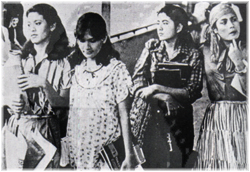Moral is a landmark film not only because it tackles important feminist issues relevant today, but because it stands as a testament to the shifting sexual and social mores of a turbulent decade in Philippine film history.
The film explores the intertwining stories of four young women: a promiscuous drug addict (Tolentino) in love with a student activist (Sandico); an inept singer (Alajar) who sleeps her way to fame; a lawyer (Andolong) who is hopelessly devoted to a homosexual husband (Rodrigo); and an expectant mother (Marin) who finds her personal ambitions frustrated by a chauvinist husband.

Though the milieu of Moral places it in the intensely personal, the scope of the film is wide and ambitious. Aside from talking about feminist issues such as abortion, prostitution, motherhood, the right to work and the double standard in sexual behavior, it also manages to make comments on such realities as patriarchy, homosexuality, military violence and the encroachment of the state on individual rights. As the real and authentically written women of Moral learn to draw their own truths and victories, the audience will likewise glean valuable insights - from the victory of Philippine filmmaking that is, Moral.

Rated "A" by the Film Ratings Board in 1982; Best Screenplay, Metro Manila Film Festival (1982); Second Best Picture, Metro Manila Film Festival (1982); Uncut version was heavily censored by the Marcos Regime during its commercial release in the early 80s.
Direction: Marilou Diaz-Abaya
Story/Screenplay: Ricardo Lee
Cinematography: Manolo Abaya
Editing: Manolo Abaya and Mark Tutanes
Sound: Amang Sanchez
Production Design: Fiel Zabat
Music: George Canseco
Executive Producer: Jesse Ejercito
Cast:
Lorna Tolentino
Sandy Andolong
Anna Marin
Gina Alajar
Ronald Bregendahl
Juan Rodrigo
Michael Sandico
Laurice Guillen
Mia Guttierrez
Lito Pimentel
Odette Kahn
Dexter Doria
Manny Luna
Viewers comments